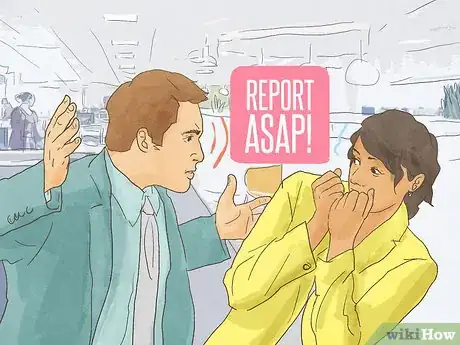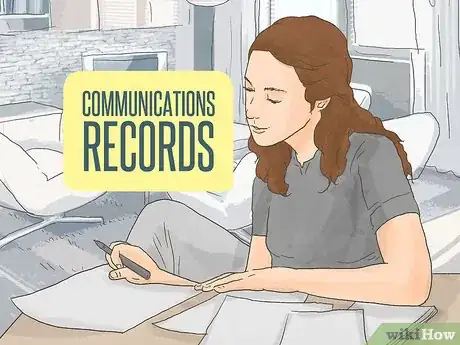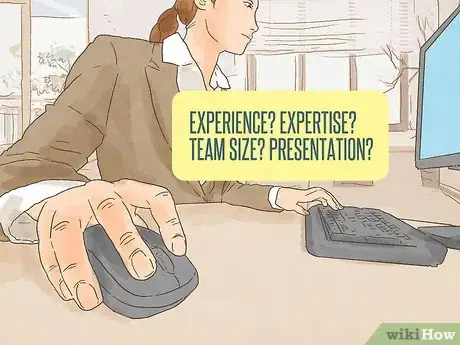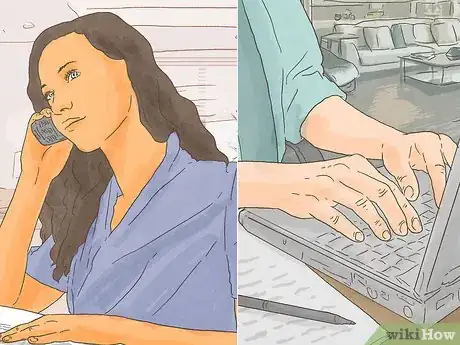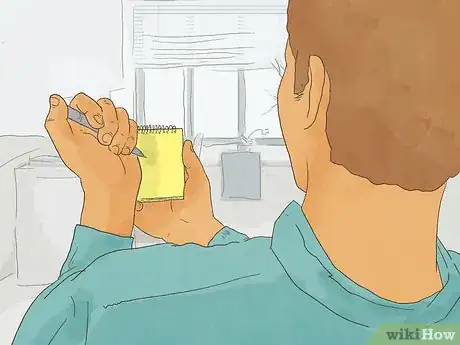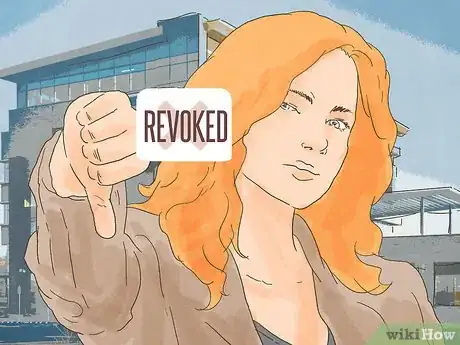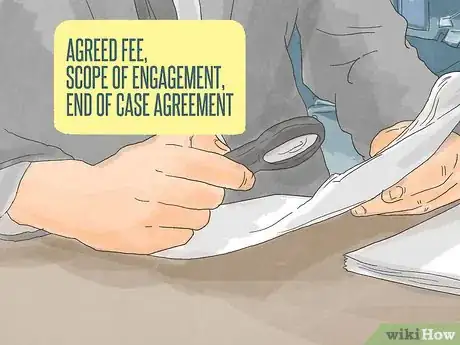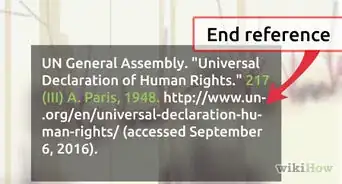This article was co-authored by Clinton M. Sandvick, JD, PhD. Clinton M. Sandvick worked as a civil litigator in California for over 7 years. He received his JD from the University of Wisconsin-Madison in 1998 and his PhD in American History from the University of Oregon in 2013.
There are 21 references cited in this article, which can be found at the bottom of the page.
This article has been viewed 24,011 times.
If you have been discriminated against on the basis of your race, gender, sexual orientation, or disability, then you may want to sue for a violation of your civil rights. To find a competent civil rights lawyer, you need to gather referrals and then meet with a few lawyers for a consultation. Ultimately, the decision of whether to hire a lawyer is up only to you. You can make an informed decision by researching the attorney’s experience and paying attention to certain warning signs.
Steps
Preparing to Search
-
1Identify your type of civil rights dispute. Your civil rights can be violated in a variety of ways. You should identify your type of civil rights lawsuit before you search for an attorney. Some attorneys specialize in only some areas of civil rights law but not others.
- Employment discrimination. This is a common form of civil rights lawsuit. Federal law prohibits discrimination on the basis of age, disability, genetic information, sex (including pregnancy), religion, race, national origin, and color. It also prohibits harassment on the basis of these protected categories.[1] Before filing a lawsuit, you must report the discrimination to a government agency.[2]
- Housing discrimination. Federal law also prohibits housing discrimination on the basis of religion, sex, disability, familial status, race, color, and national origin.[3]
- Police misconduct. The police violate your constitutional rights when they use more force than necessary to arrest or detain you. If so, you can bring a “section 1983” claim for the violation.[4] Many civil rights attorneys handle these cases.[5]
-
2Write down your memories of the incident. Even before finding a lawyer, you should begin to pull together all of the evidence you have that relates to the civil rights violation. One of the first things you can do is sit down and write out your memories of the event.[6]
- Try to remember all important details, including who said what, or what actions people took. Also, be honest and record what you said or did.
- Date and sign your statement. This will help make the statement more authentic.
Advertisement -
3Find witnesses. You should also try to get the names and contact information of anyone who witnessed the discrimination.[7] Witnesses are a key part of any lawsuit and you want to identify the witnesses as soon as possible.
- If you were discriminated against in employment or housing, then write down the name of all people you were in contact with at the leasing office or the employers.
- If you were the victim of police misconduct, then try to catch the names of the officers as well as bystanders. If you are being restrained, then have someone with you try to collect this information.
-
4Preserve documents. Save any document related to your civil rights claim. These documents can include emails, letters, memos, and police reports. An attorney will want to see them when you meet for a consultation.
- If you have a lot of documents, then it might be helpful to create a binder in which you can store witness statements, communications, and official reports. Organize the binder in a meaningful way and take it with you when you meet with a lawyer.
-
5Locate the county in which you suffered discrimination. Generally, you can bring a lawsuit in the county where the discrimination occurred or where the defendant lives or does business.[8] It is often easier to hire an attorney who is based near the county where the incident happened, so keep this in mind as you search for a civil rights attorney.
- If you were assaulted by police while visiting relatives in another state, then you will need to hire an attorney who works in that state. You cannot hire an attorney in your home state to represent you.
Gathering Referrals
-
1Ask friends or co-workers. You can try to get recommendations from anyone that you know. Ask people if they have ever had to file a civil rights lawsuit and whether or not they would recommend their attorney.
- No matter how much you trust the person who gives you a referral, don’t automatically hire the lawyer they recommend. [9] Different people have different communication styles and expectations from a lawyer. You still want to meet with the lawyer and judge for yourself how well you get along.
-
2Follow the news. Civil rights lawsuits often make the news. Police brutality, employment discrimination, and housing discrimination cases are often high profile and are reported on television or in the newspaper. Pay attention to the names of the lawyers interviewed. They are probably experienced civil rights attorneys who you can contact.
-
3Call your local bar association. Each state (and many counties) have bar associations, which are private associations of lawyers. Most of these bar associations run referral programs.[10] By contacting the referral program, you can get the name of one or more civil rights attorneys.
- To find a bar association, you can search the Internet. Type your state or county and “bar association referral.” There should be a phone number to call or an online submission form that you can fill out.
-
4Contact legal aid organizations. These organizations provide free or legal services to people in financial need (often defined as those within 125% of the federal poverty level).[11] If you choose to go with a legal aid attorney, however, be advised that you probably will have to work with whatever attorney is assigned to you. Legal aid organizations often have tight budgets and busy workloads; it is unlikely that you can pick and choose which legal aid attorney to work with.
- To find a legal aid organization near you, search the Legal Services Corporation’s website at www.lsc.gov. At the homepage, click on “Find Legal Aid” and then enter your zip code. Links or contact information will be provided to legal aid organizations in your area.
Researching Civil Rights Attorneys
-
1Look at websites. Once you have a list of civil rights lawyers, you should begin researching them. Today, most attorneys have websites. You should visit the website and look through it to see how well-written and neat the website appears. A sloppy, poorly written website may indicate that the lawyer is not diligent or careful.
-
2Search for relevant experience. Each lawyer should also list representative cases that he or she has worked on. For example, an employment discrimination attorney should tell visitors about recent employment cases. Often, the attorney will give a capsule summary of the case and tell you how much money the client won in a settlement or at trial.
- If you are bringing an employment discrimination claim, then do not be impressed by how successful the attorney has done in product liability cases. That is a different area of law.
- Also check to see that the attorney has handled a similar case recently. The law often changes regularly, so you want an attorney who is familiar with the current status of the law.
-
3Read online reviews. Many websites now have online reviews posted about lawyers. Popular websites include Avvo, Google, Yelp, and Martindale.[12] You can visit these websites and type in the lawyer’s name to see what former clients have had to say.
- Remember a few basic caveats when reading online reviews. First, every lawyer has a disgruntled client or two.[13] The fact that you see a negative review does not mean the person is a bad lawyer.
- People may be more motivated to leave negative reviews than positive ones. Think about your own positive experiences with your dentist, doctor, or business that you frequent. How many times have you left an online review? Many people are motivated to review only when upset. So the lack of positive reviews may not be meaningful.
- Instead of treating each individual review as definitive, look for common themes. If many clients mention having difficulty contacting the attorney, then the lawyer may indeed have a problem in that area.
-
4Search for ethics violations. Each state has an attorney disciplinary board that investigates charges of misconduct. If the lawyer has been accused of violating ethics rules, then the organization investigates the charge and, if necessary, disciplines the attorney.[14] This information is then made public.
- You should find the state’s disciplinary agency by searching the Internet for “lawyer discipline” and then the state.
- Once at the website, you can use a “Lawyer Search” function. Type in the attorney’s name and see if any disciplinary history has been listed. There may also be a list of disciplined attorneys available on the website for you to browse.[15]
-
5Narrow your list. After researching the attorneys, you should try to narrow your list down to three or four lawyers. You will want to meet for consultations with a handful of lawyers. If your list is too long, you will take too much time.
- You should probably consider experience, location, and reviews as you winnow down your list. Remember that the more experience a lawyer has, the higher his or her fees typically are.
- Nevertheless, don’t hesitate to reach out and contact an experienced lawyer. If the lawyer’s fees are too high, then he or she can refer you to another civil rights attorney who charges a reasonable fee.
Meeting for a Consultation
-
1Call a few attorneys. You should call to schedule consultations with the attorneys on your shortlist. Some attorneys will have secretaries or paralegals ask you questions on the phone in order to screen whether or not your case is something that the office typically handles. Ask for a consultation.
- Some attorneys offer free or reduced-fee consultations.[16] You should ask about the price before confirming your consultation. Also ask how you can pay the fee (check, credit card, cash).[17]
- You should insist on meeting in person (unless that doesn’t work for you). By meeting in person, you get a better sense of how organized the lawyer is and what his or her communication style is like.
-
2Prepare for the consultation. Once you have your consultations scheduled, you should prepare by gathering any documents related to your claim.[18] Get together police reports, hospital reports, employer letters, etc.
- Be sure to take only copies to the attorney. Also, be sure to take your copies with you after the consultation unless you agreed to hire the lawyer on the spot.
-
3Draft a list of questions. Before going to the consultation, you should come up with questions that are important to you. You might not have a lot of time. Consultations generally don’t run over half an hour. However, there should be time for you to ask a few questions.
- You could ask how many cases the attorney has handled that are like yours.[19] For example, if you are bringing an excessive force claim against the police, then you would want to know how many of those cases the lawyer has handled.
- Also ask if there are other ways to resolve your civil rights dispute.[20] For example, the lawyer might think arbitration or settlement is a better route to take.
- Ask how the lawyer communicates. Does he or she send regular emails? Is the lawyer available by telephone? Can you stop in and visit? It is important to understand how the lawyer communicates since communication is often a source of conflict between clients and attorneys.
- Ask about the likely outcome.[21] Here, you get to see how the attorney analyzes your case and how knowledgeable he or she is about the law.
- Don’t ask questions that you can learn the answer to by looking at the lawyer’s website. For example, “Where did you go to law school?” and “What year did you graduate?” should be answered on the website.
-
4Arrive on time. Give yourself plenty of time to find parking or deal with public transportation. The lawyer is probably busy and has other things scheduled around your consultation. Be sure to have the office number on your phone in case you need to call because you are running late.
-
5Ask about fees. One question to be sure to ask is how the attorney bills. Civil rights attorneys can offer a variety of billing options. For example, some might offer straight hourly billing, in which you are charged an agreed amount per hour of work.
- Often, civil rights attorneys will represent clients on contingency. With contingency fee agreements, the lawyer will only get paid if you win or settle your case. In those situations, the lawyer will take around a third of your settlement or jury award.[22] As the plaintiff, you will still be responsible for court costs, such as fees associated with filing the lawsuit and with court reporters.
- If you bring a section 1983 claim for police misconduct, then you can seek reasonable attorneys’ fees if you win.[23] This means that the defendant would pay for your lawyer.
Hiring the Right Lawyer
-
1Avoid bad attorneys. After meeting for consultations, look over your list of attorneys and begin to strike out those you didn’t like. You should look for the following “red flags,” and avoid these attorneys accordingly:
- The lawyer promised you would win.[24] In truth, no lawyer can guarantee how your case will turn out. A lawyer can offer a professional guess, backed up with reasons. But any lawyer who promises a result should be avoided.
- The attorney’s staff is rude to you. A lawyer who tolerates rude staff does not care about his clients.
- The lawyer’s office is messy. This signals that the attorney is not careful. A messy office also makes it hard to keep client information confidential. If you see files stacked all over the place or papers covering the lawyer’s desk, then you might want to cross him or her off your list.
-
2Ask yourself a few questions. To help yourself choose a lawyer who is right for you, ask yourself the following questions. If you say “no” to any of these questions, then you should think twice before hiring the attorney:[25]
- Did you feel comfortable meeting with the lawyer?
- Did the lawyer project sufficient skill and experience to handle your case?
- Did you understand the lawyer’s explanation of your case?
- Is the fee reasonable?
-
3Make a decision. Only you know which attorney is the right one for you. Some people might prioritize a lawyer who is a good communicator over someone with extensive experience. Trust your gut to make the right choice.
- If you didn’t feel comfortable or confident with any of the lawyers you met with, then you will need to get additional referrals and schedule more consultations.
-
4Call the lawyer. You can call the lawyer and tell him or her that you would like to hire them. Ask what information they need from you, and tell the attorney where to send the engagement letter for you to sign. You will not have a formal attorney-client relationship until that time.
-
5Read the engagement letter. The attorney should send you an engagement letter that spells out the terms of the representation. This letter should indicate what happens to the client file when the case ends, whether the attorney agrees to represent you on appeal, and to who the attorney may assign work.
- Also read the fee agreement. This agreement may be included as part of the letter or may arrive separately. The agreement should spell out in detail how the lawyer’s fees are being calculated and when you will be billed.
- If you don’t agree with something in either the engagement letter or the fee agreement, then call the lawyer and have it fixed before signing. You should only sign agreements with the lawyer when you agree with everything in the document.
- You should make sure that both the fee agreement and the engagement letter are in writing. Keep a copy for your records after signing.[26]
References
- ↑ https://www.eeoc.gov/discrimination-type
- ↑ http://civilrights.findlaw.com/enforcing-your-civil-rights/lawsuits-for-civil-rights-violations-and-discrimination.html
- ↑ http://portal.hud.gov/hudportal/HUD?src=/topics/housing_discrimination
- ↑ http://www.nolo.com/legal-encyclopedia/suing-the-police-excessive-force.html
- ↑ http://www.loevy.com/
- ↑ http://civilrights.findlaw.com/civil-rights-overview/police-misconduct-and-civil-rights.html
- ↑ http://civilrights.findlaw.com/civil-rights-overview/police-misconduct-and-civil-rights.html
- ↑ http://www.nolo.com/legal-encyclopedia/state-courts-venue-rules-govern-29656.html
- ↑ http://www.nolo.com/legal-encyclopedia/find-lawyer-how-to-find-attorney-29868.html
- ↑ http://www.nolo.com/legal-encyclopedia/finding-personal-injury-lawyer-29840.html
- ↑ http://www.justice.gov/atj/civil-legal-aid-101
- ↑ https://www.linkedin.com/pulse/signs-you-have-bad-lawyer-jeffrey-rasansky
- ↑ http://www.nolo.com/legal-encyclopedia/should-i-hire-lawyer-bad-online-reviews.html
- ↑ http://hirealawyer.findlaw.com/choosing-the-right-lawyer/researching-attorney-discipline.html
- ↑ http://www.wicourts.gov/services/public/lawyerreg/status.htm
- ↑ http://hirealawyer.findlaw.com/choosing-the-right-lawyer/ten-questions-to-ask-your-potential-lawyer.html
- ↑ http://www.workplacefairness.org/attyfees#1
- ↑ http://www.cccba.org/community/find-a-lawyer/get-prepared.php
- ↑ http://hirealawyer.findlaw.com/choosing-the-right-lawyer/ten-questions-to-ask-your-potential-lawyer.html
- ↑ http://hirealawyer.findlaw.com/choosing-the-right-lawyer/ten-questions-to-ask-your-potential-lawyer.html
- ↑ http://hirealawyer.findlaw.com/choosing-the-right-lawyer/ten-questions-to-ask-your-potential-lawyer.html
- ↑ http://www.workplacefairness.org/attyfees#5
- ↑ https://www.isba.org/sections/localgovt/newsletter/2014/10/smallverdictlargeattorneyfeeawardlo
- ↑ http://texaslegal.org/texaslegal-blog/3-red-flags-to-watch-for-in-your-lawyer
- ↑ http://www.calbar.ca.gov/Public/Pamphlets/HiringaLawyer.aspx#6
- ↑ http://www.calbar.ca.gov/Public/Pamphlets/HiringaLawyer.aspx#6
